ARO Piston Pump Solutions for Adhesive & Sealants Industry
Adhesives and sealants are commonly used in electronic manufacturing, automotive assembly, window and door manufacturing, solar panel construction, and more. Their use demands consistent and accurate dispensing. ARO’s durable piston pumps are perfect for leak-free performance when applying adhesives and sealants. They’re used to dispense, spray, and inject fluids with precision, including:
- Silicone adhesives and sealants
- Epoxy adhesive & sealant
- Adhesives & sealants for paint & coating industry
- And other industrial sealants and adhesives
Ever since 1930, businesses have relied on ARO for efficient and reliable pumps. ARO’s piston pumps are made with material that can handle abrasive and corrosive fluids for long-term durability. Based on its application, ARO offers three solutions for different viscosity materials:
- Chop-check piston pumps
- 2-ball piston pumps
- 4-ball piston pumps
Let’s discuss them in detail below.
ARO Piston Pumps for Adhesives and Sealants
-

Aro’s chop-check pumps are designed to work with medium-to-high-viscosity fluids, such as silicon sealants and heavy lubricants. They ensure a steady flow of adhesives and sealants for continuous and efficient operations.
Advantages:
- Chop-check pumps can deliver high performance at a desired pressure by precisely applying viscous adhesives and sealants.
- Depending on the model you select, an ARO chop-check pump can provide great efficiency with a flow rate of up to 12.2 GPM (46 l/min).
- The mechanical and flat checks of chop-check pumps can handle stringy materials that may resist cut-off or even adhere to themselves.
- Chop-check pumps with high ratios can generate fluid pressure enough to move tacky materials that can adhere to the hose or equipment.
-

ARO 2-ball piston pumps are great for medium to low-viscosity adhesives and sealants. They can precisely handle fluids, such as acrylic adhesives or polyurethane sealants, which may have suspended beads or can shear easily.
Advantages:
- ARO’s 2-ball pumps offer consistent spraying with regulated pressure, which is required for a proper coating application.
- Some 2-ball pump models can offer great results with a flow rate as high as 18.1 gpm (82.3 l/min).
- ARO’s 2-ball pumps work better with shear-sensitive materials than similar pumps by minimizing friction points.
- Due to the minimization of friction points, ARO 2-ball pumps are also good for maintaining a consistent flow of abrasive and high-solid materials.
- If you want stronger protection against abrasive fluids, you can have additional ceramic coating on the 2-ball pump.
-

ARO’s 4-ball piston pumps are perfect for high-volume transfer and material recirculation. They also do well with lower-viscosity fluids, such as adhesives & sealants used in the paint & coating industry.
Advantages:
- 4-ball pumps can move high volumes of adhesives and sealants, minimizing the time to fill and empty large containers.
- The double-acting pumping results in a high flow rate, which is suitable for large-scale transfers of low-to-medium-viscosity adhesives and sealants.
- The stainless steel built-in to the ARO 4-ball pump lower ends works well with water-based materials that could be corrosive.
- The plunger rod and cylinder tube have a 2x longer service life due to their ceramic coating, which protects the ARO 4-ball pumps from high-abrasive fluids.
How To Select The Right Piston Pump
If you want maximum efficiency in adhesives and sealants application, choosing the right piston pump is important. Make sure you take the following considerations while choosing your ARO piston pump:
- Type of fluid: Identify what material you’ll use with the piston. Your pump selection will depend on whether the material is an adhesive, sealant, lubricant, or coating.
- Viscosity or thickness of fluid: As we discussed, ARO’s each piston pump is suitable for specific viscosity. The chop-check works better with highly viscous fluids while the ball pumps are good for lower viscosities. The fluid thickness will determine the mechanical specifications of the pump needed to effectively dispense the adhesive or sealant.
- Flow rate: Your operational limits will dictate the volume dispensation required. Choose a pump that can offer the desired flow rate for a consistent volume for the operations.
- Output pressure: Each piston pump has a specific output pressure. Determine what’s the necessary output pressure to overcome fluid resistance for effective material application resistance.
ARO is dedicated to offering its clients technological excellence and high-quality pump solutions. This made the company a leading piston pump manufacturer in the adhesives & sealants industry. ARO’s piston pumps give operational efficiency that can match the highest quality standards in product manufacturing.
Check ARO to learn about industrial applications of ARO Piston Pumps. Reach out today to power your operations with ARO's world-class fluid management solutions to achieve highest production efficiency.
 Global (EN)
Global (EN)